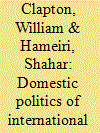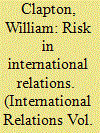|
|
|
Sort Order |
|
|
|
Items / Page
|
|
|
|
|
|
|
| Srl | Item |
| 1 |
ID:
110203


|
|
|
|
|
| Publication |
2012.
|
| Summary/Abstract |
Recent work has identified new hierarchical relationships within international society. However, few scholars have provided a satisfactory account of what informs their formation, reproduction or constitutional effects for international society. We argue that underpinning the emergence of a more hierarchical international society is a new social logic of risk, which constructs illiberal and/or fragile states as potentially dangerous sites of instability and disorder that pose particular security risks for Western states. We proceed to argue that such risk-based hierarchies are transformative of both inter-state and intra-state relations, by stripping equal political agency from 'risky' actors within and without the state. We demonstrate these claims by drawing on examples of international state building in Southeast Asia and the Southwest Pacific.
|
|
|
|
|
|
|
|
|
|
|
|
|
|
|
|
| 2 |
ID:
178499


|
|
|
|
|
| Summary/Abstract |
Risk has recently become a core aspect of the study and practice of security. This raises the question of how the governing of security issues has changed and how risk is situated vis-à-vis other approaches, particularly securitisation theory. One approach is to distinguish securitisation and risk within typologies of ideal-type logics of security, which suggest that while both are useful, securitisation and risk are fundamentally different. One of the crucial distinctions made here is that risk is geared towards the longer-term, routine, and ‘normal’ governance of security issues, while securitisation involves the employment of exceptional measures justified via invocations of existential threat. This article interrogates this distinction, arguing that the division between risk as the normal or routine and securitisation as the exceptional is not as clear as has been suggested in either theory or practice. Risk can and repeatedly has resulted in exceptionalism. This argument is demonstrated empirically through an analysis of the immigration practices and policies of the Trump administration, particularly the travel ban and the declaration of a national emergency to fund construction of a wall along the US-Mexico border.
|
|
|
|
|
|
|
|
|
|
|
|
|
|
|
|
| 3 |
ID:
158439


|
|
|
|
|
| Summary/Abstract |
The classical narrative of the historical evolution of a pluralist international society emphasizes its European origins: emerging in Europe and then progressively expanding worldwide via European colonialism. It is a narrative that is based on particular dualities, such as those of international system and society and sovereignty/anarchy and hierarchy. These dualities create a dichotomy within the classical narrative between an ostensibly pluralist, European international society and the world beyond it, largely insulating its depictions of the evolution of the norms and institutions of the former from the hierarchies and empires of the latter. This article advances a different narrative of the evolution of pluralism within international society, suggesting that pluralism has only been reflected in the practices of the society of states since decolonization. Even after decolonization, there have been continued exceptions and violations to pluralist norms, signifying a contemporary international society that is both pluralist and hierarchical.
|
|
|
|
|
|
|
|
|
|
|
|
|
|
|
|
| 4 |
ID:
086619


|
|
|
|
|
| Publication |
2009.
|
| Summary/Abstract |
Several recent works have emphasised contemporary hierarchical trends within international society that suggest a transition away from international society's pluralist constitution. These trends have been most readily demonstrated by the willingness of dominant states, such as the United States, to conduct interventions in support of the promotion and enforcement of liberal democratic values. Yet while many scholars have identified these hierarchical trends, few have considered what such trends suggest regarding the underlying normative constitution of international society. This paper seeks to explain why such a transition within the normative constitution of international society has occurred. Utilising Ulrich Beck's notions of risk and the 'world risk society', this paper suggests that an increasing preoccupation with globalised security risks within international society, particularly on the part of the West, underpins this constitutional transition. The West's perceived need to manage global security risks via intervention in so-called 'risky zones' structures the new normative basis of international society. Risk has altered the constitutional structure of international society in a way that gives rise to various hierarchical and anti-pluralist trends.
|
|
|
|
|
|
|
|
|
|
|
|
|
|
|
|
| 5 |
ID:
108056


|
|
|
|
|
| Publication |
2011.
|
| Summary/Abstract |
Risk is a concept that has recently filtered through into International Relations (IR). However, the literature on risk, risk management and IR is still comparatively small and there is still significant scope for the theorisation of these concepts in an IR context. Thus far, the literature on risk and IR has been largely characterised by the debate between critical realist, constructivist and post-structuralist approaches to risk. At the core of these debates is the ontological question of whether risks are 'real' or not. However, this article will suggest that these ontological debates have grown stale and are unhelpful to furthering the research agenda on risk and IR. As this article will demonstrate, we need to systematically develop ways for both explaining risk identification, assessment and management -what might be termed 'riskisation' - and why particular forms of risk management emerge in particular situations and not others.
|
|
|
|
|
|
|
|
|
|
|
|
|
|
|
|
|
|
|
|
|